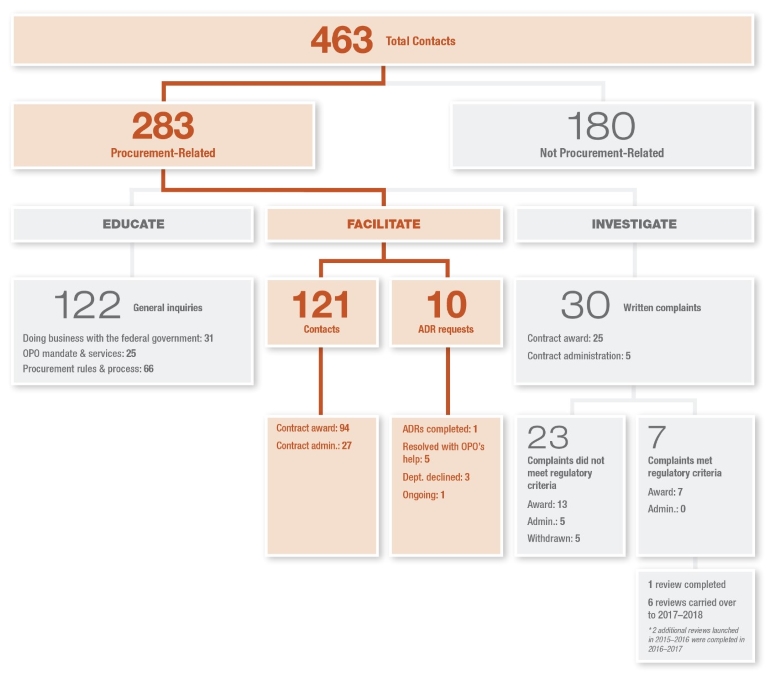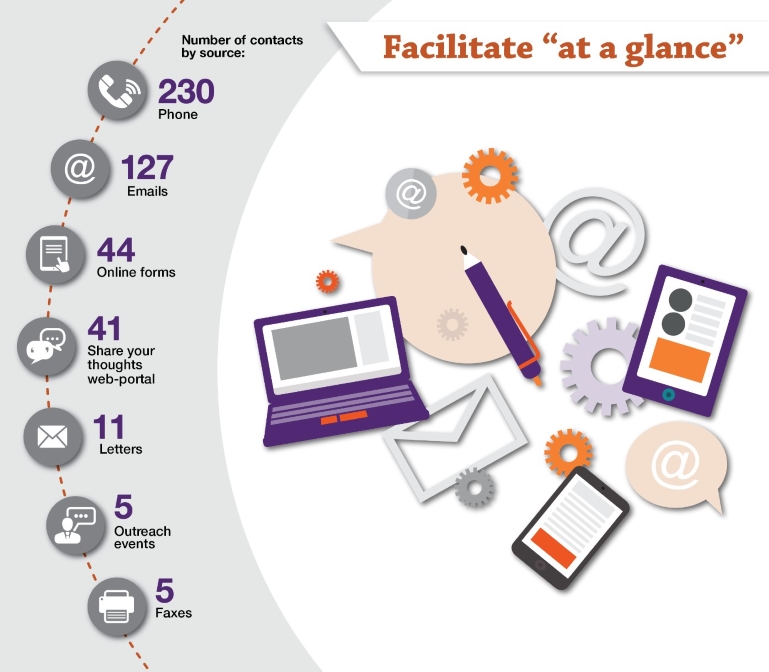Facilitate: Office of the Procurement Ombudsman Annual Report 2016-2017
"I am delighted that the matter was resolved in a timely manner, and with a very positive outcome! Your responsiveness and counsel were greatly appreciated; I am happy that we didn't have to formalize any requests through your office." - Supplier

Image description
This diagram emphasizes that of the 283 procurement-related contacts, 131 were determined to fall within the Office's Facilitate pillar. Out of these contacts, 121 were contacts about contract issues, while 10 were requests for OPO to conduct an ADR. Out of the 121 contacts, 94 were concerns about the award of a contract, while 27 were concerns about the administration of a contract. Out of the 10 ADR requests, 1 was successfully completed, 5 were resolved informally with the help of OPO, 3 were declined by the department, and 1 is ongoing at the time of the report's preparation.
What OPO did to help resolve issues
Suppliers contacting OPO with a procurement-related issue are initially encouraged to provide the federal organization in question with the opportunity to respond and address their issue. In many cases, resolutions can most efficiently be achieved through direct communication between the supplier and federal organization.
In situations where a supplier has been unsuccessful in their attempts or is dissatisfied with their interactions with the organization, OPO can assist by playing a "go-between" role. This involves obtaining an understanding of the supplier's issues and contacting the federal organization to discuss them. Once the Office has obtained the organization's perspective, the information is relayed back to the supplier. This process is repeated as necessary and, in many cases, the Office succeeds in facilitating a resolution. In addition, OPO is often able to re establish communication between the supplier and federal organization, enabling them to resolve the issues directly.
Of the 283 procurement-related contacts OPO received in 2016–2017, 121 were contacts where the Office facilitated communications between the supplier and the federal organization. Examples where OPO helped facilitate a resolution include:
- Playing a "go between" role
A supplier contacted OPO regarding a solicitation for the establishment of a standing offer. While the solicitation had closed, the standing offer had not been awarded and the supplier was seeking an update. The supplier sought OPO's help due to the lack of success in obtaining a response from the federal organization despite repeated attempts. OPO contacted the federal organization and obtained the information the supplier was seeking. The supplier appreciated OPO's help in obtaining a response, stating "I do appreciate your and OPO's help in this matter". - Re-establishing communication
A supplier contacted the Office regarding a regret letter sent by a federal organization that stated the supplier's proposal had failed to satisfy a mandatory requirement and the supplier had therefore not been awarded the contract. The supplier believed the proposal had met all mandatory requirements in the solicitation. OPO encouraged the supplier to try to resolve their concerns directly with the organization in question, however communications had ceased. OPO contacted the organization, who agreed to contact the supplier. The supplier was able to obtain additional information from the organization.
It has become apparent that in playing this "go between" role, often it isn't the information OPO provides as much as the recipient hearing it from a neutral source that has no vested interest in the outcome (other than helping resolve the issue). Consequently, the Office plays an important role in helping resolve procurement-related issues before they escalate. OPO's interest is to help resolve issues as quickly and informally as possible.
When issues cannot be resolved informally, the Office may offer alternative dispute resolution services in instances where a supplier and federal organization have a contract and a dispute has arisen.

Image description
This diagram outlines the number of contacts received by OPO. During the 2016-2017 fiscal year, OPO received 230 phone contacts, 127 email contacts, 44 online form submissions, 41 submissions through our ‘Share your thoughts' web-portal, 11 letters, 5 contacts from outreach events, and 5 faxes.
Alternative Dispute Resolution
Of the 283 procurement-related contacts that OPO received in 2016–2017, 10 were written requests for alternative dispute resolution (ADR) services.
The Office provides ADR services when disputes involve the interpretation or application of the terms and conditions of a federal contract. One of the parties to the contract—the supplier or federal organization—must request the services in writing. As OPO's ADR services are voluntary, both parties to the contract must agree to participate. OPO's no-fee ADR services offer an opportunity for the parties to come together in a neutral setting to participate in confidential, open and constructive dialogue. More importantly, OPO's certified mediators do not impose decisions (i.e. arbitrate) in the dispute; rather they walk the participants through a mediation process that should permit the participants to reach a mutually agreeable resolution to the dispute.
When both parties agree to participate, OPO's certified mediators have a successful track record of helping to mediate disputes and helping the parties re-establish their business relationships.
Of the 10 ADR requests received in 2016–2017:
- 1 request for ADR services was initiated and carried into 2017–2018.
- 3 requests resulted in federal organizations declining to participate in OPO's ADR services. As OPO's ADR services require both parties to a federal contract to voluntarily participate, these requests could not proceed.
- 1 request resulted in an ADR process that was successfully completed, resulting in a settlement agreement:
OPO received a request for ADR services from a supplier having a dispute with a federal organization about the amount of work requested through a standing offer. While the federal organization had no contractual obligations to the supplier through the standing offer, given it is not a contract, the supplier made important business decisions based on the expected work volumes.
The parties agreed to participate in OPO's ADR process. Through a face-to-face mediation session and subsequent extensive back and forth between the parties using shuttle mediation, OPO was able to help the parties find a resolution to the dispute.
The lesson learned from this case is that all parties must be clear on their roles, responsibilities and expectations regarding standing offers. Suppliers must understand that anticipated volume of work referenced in a standing offer solicitation is not a guarantee of business. In addition, federal organizations may have the option of obtaining the good or service in question using other means or other procurement vehicles. On the other hand, federal officials must realize that suppliers make business decisions, including substantial investments, based on information found in the solicitation documents and on the assumption that federal organizations will use the standing offers they have established. Therefore, setting clear expectations, providing accurate anticipated volumes of work and informing suppliers of anticipated changes in a timely manner are important from a supplier perspective. - 5 requests were withdrawn by the suppliers after OPO helped parties reach a resolution before a formal ADR process was initiated:
- A supplier stated a federal organization had not paid for work completed under the contract and the interest on the overdue payment. OPO contacted the organization, which stated it was processing the work payment and would subsequently look into paying the interest. Shortly thereafter, the supplier received payments for the work and interest.
- A supplier stated a federal organization was acting in bad faith by attempting to "poach" the supplier's resources by offering to contract with them directly. OPO discussed the issue with both parties, who subsequently agreed to meet to discuss the situation bilaterally.
- A supplier stated they were not being paid for goods they supplied under the contract. OPO reached out to the federal organization and was told payment could not be completed until a debt arrangement under the contract was finalized, which was handled by another federal organization. As the process was not moving forward, OPO found the appropriate contacts within the federal organizations who could help complete the process and the supplier was paid.
- A supplier stated a federal organization was not paying for work completed and the contract would be terminated for failure to complete work. OPO reached out to the federal organization and was told the organization would look into the issue and would not be cancelling the contract. The supplier and the federal organization reached a settlement resulting in payment to the supplier.
- A supplier and federal organization disagreed on whether postage charges would be reimbursed due to a lack of clarity in the contract. OPO reached out to the organization, who then conducted an internal review. The organization proposed a settlement, which was accepted by the supplier.
These five cases demonstrate the Office's ability to help resolve issues between suppliers and federal officials informally prior to undertaking a formal dispute resolution process. They also reinforce the principle that communication is critical to the resolution of disputes. As a neutral organization, OPO can help suppliers and federal officials resolve their issues thereby bypassing the time and energy needed to respond to issues as they escalate, avoiding costly and time-consuming litigation, and allowing both sides to get back to business.
While OPO has often been effective in facilitating the resolution of issues between suppliers and federal organizations, occasionally the Office is made aware of specific cases, or identifies potential systemic procurement practices, which bring into question the fairness, openness or transparency of federal procurement. In those cases, the Office relies on its third pillar: Investigate.
"Thank you for your help in making this happen after so many months. Greatly appreciate your intervention. There is no doubt in my mind without your help, I'd still be sitting here wondering when [the federal organization] would act." - Supplier
- Date modified: